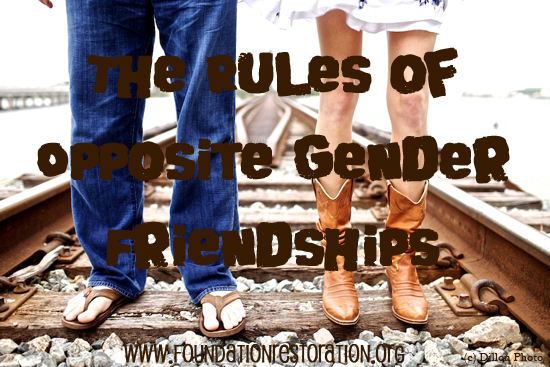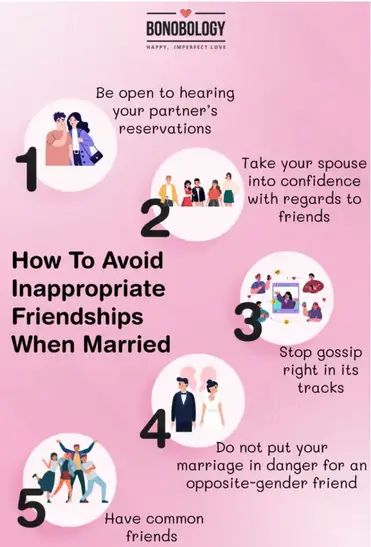
In this article, you will explore the intricacies of managing boundaries with friends of the opposite sex. Navigating these relationships can sometimes be tricky, as societal expectations and personal comfort zones can play a significant role. By examining various perspectives and strategies, you will gain insight into how to maintain healthy boundaries and foster meaningful connections with friends of the opposite sex. So, let’s embark on a journey of understanding and discover the keys to managing these unique friendships.
Establishing Clear Boundaries
Define Your Personal Comfort Level
When it comes to establishing clear boundaries with friends of the opposite sex, it is essential to first define your personal comfort level. Everyone has different levels of comfort when it comes to friendships and interactions. Take the time to reflect on what makes you feel comfortable and what makes you feel uneasy. Consider factors such as physical touch, personal space, emotional intimacy, and anything else that may be relevant to you. Understanding your own boundaries will help you navigate friendships with a clearer sense of what feels right for you.
Communicate Your Boundaries Clearly
Once you have defined your personal comfort level, it is important to communicate your boundaries clearly to your friend. Remember that open and honest communication is key to maintaining a healthy relationship. Express your boundaries in a calm and friendly manner, ensuring that your friend understands what is and isn’t acceptable to you. Use “I” statements to clearly convey your feelings and intentions without sounding accusatory. Your friend will appreciate your honesty and will likely reciprocate by sharing their own boundaries as well.
Respect Your Friend’s Boundaries
Just as it is important for you to define and communicate your own boundaries, it is equally essential to respect the boundaries of your friend. Every individual has their own set of boundaries, influenced by their experiences, beliefs, and personal preferences. It is crucial to acknowledge and honor these boundaries in order to maintain a healthy and harmonious friendship. Respect your friend’s wishes if they express discomfort or establish certain limits. By doing so, you demonstrate care and consideration for their feelings, ultimately strengthening your bond.
Maintaining Open Communication
Encourage Honest Conversations
To maintain a healthy friendship with clear boundaries, it is vital to encourage honest conversations with your friend. Create a safe and non-judgmental space where both of you feel comfortable expressing your thoughts and feelings. Regularly check in with each other and discuss any concerns or issues that may arise. Remember that open communication fosters trust, understanding, and mutual respect. By actively listening and valuing each other’s perspectives, you can address potential misunderstandings or conflicts before they escalate.
Avoid Ambiguity in Communication
When discussing boundaries with your friend, it is crucial to avoid ambiguity and vagueness in your communication. Clearly articulate your expectations, intentions, and limits to minimize any potential confusion. Be specific about what actions or behaviors cross your boundaries and provide concrete examples to illustrate your points. By being clear and concise in your communication, you reduce the likelihood of misunderstandings or unintentional boundary violations.
Regularly Check-in with Each Other
Maintaining open communication requires ongoing effort and regular check-ins. Schedule time to have conversations with your friend specifically about your boundaries and the friendship dynamics. This can be a simple and casual catch-up where you both share any changes or updates to your boundaries. By regularly checking in with each other, you acknowledge the fluid nature of boundaries and the importance of adapting and growing together. These check-ins create an environment of mutual understanding and ensure that both parties feel heard and supported.

This image is property of www.allenparr.com.
Setting Physical Boundaries
Determine Your Physical Boundaries
Physical boundaries are an integral component of any friendship, especially with friends of the opposite sex. Take the time to determine your physical boundaries and what you are comfortable with. This can include factors such as hugging, holding hands, or any form of physical touch. Reflect on your values, personal space requirements, and cultural or religious beliefs that may influence your physical boundaries. Once you have a clear understanding of your needs, you can effectively communicate these boundaries to your friend.
Establish Consent and Respect
When it comes to physical interactions, consent and respect should be at the forefront of any friendship. Both parties must give explicit consent before engaging in any physical contact. This ensures that boundaries are respected and that both friends feel comfortable and safe. Consent should be enthusiastic, ongoing, and can be withdrawn at any time without repercussions. Establishing a foundation based on consent and respect will maintain trust and preserve the integrity of the friendship.
Avoid Situations That May Lead to Compromised Boundaries
While setting physical boundaries is important, it is equally crucial to avoid situations that may lead to compromised boundaries. Assess the context of your interactions with your friend and recognize any potential risks. Be mindful of environments or activities that could potentially blur the lines or trigger uncomfortable situations. By proactively avoiding such situations, you safeguard your friendship and prevent any unnecessary tension or confusion.
Managing Social Media Interactions
Establish Privacy Settings
In today’s digital age, managing social media interactions is a key aspect of defining boundaries. Take the time to review and establish privacy settings on your social media platforms. This allows you to control who can access your content, ensuring that your personal life remains within your comfort level. Adjust settings to limit who can view your posts and photos, as well as who can send you friend requests or direct messages. By setting clear boundaries in the virtual world, you maintain a sense of privacy and protection.
Avoid Excessive Flirting or Public Display of Affection
Flirting or engaging in public displays of affection via social media can blur boundaries and send mixed signals. It is important to be mindful of the impact your online interactions may have on your friendship. Avoid excessive flirting or overly affectionate posts or comments that may be misconstrued or make either party uncomfortable. Remember that maintaining a respectful and platonic virtual presence will help reinforce the boundaries you have established in your friendship.
Maintain Respectful Online Communication
Respecting boundaries extends to online communication as well. It is essential to maintain respectful and considerate interactions with your friend on social media platforms. Be mindful of the tone and content of your messages, ensuring that they align with the boundaries you have established. Avoid engaging in gossip, sharing personal information without consent, or making derogatory comments. By fostering a culture of respect and understanding online, you reinforce the healthy boundaries you have set for your friendship.

This image is property of www.lovepanky.com.
Dealing with Jealousy and Insecurities
Acknowledge and Address Your Feelings
Jealousy and insecurities can be natural emotions that arise in any friendship, especially when friends of the opposite sex are involved. It is important to acknowledge and address these feelings in order to maintain a healthy friendship. Take the time to identify the underlying causes of your jealousy or insecurities, and reflect on how they may be impacting your interactions with your friend. By understanding the root of these emotions, you can better manage and communicate them in a constructive manner.
Focus on Building Trust
Building trust is a crucial component of managing jealousy and insecurities in any friendship. Trust is the foundation upon which all healthy relationships are built, including those between friends of the opposite sex. Work on strengthening the trust between you and your friend by being reliable, honest, and respectful. Communicate openly, address any concerns, and follow through on your commitments. By consistently demonstrating trustworthiness, you can alleviate doubts and nurture a more secure and stable friendship.
Avoid Comparisons or Unrealistic Expectations
Comparisons and unrealistic expectations can significantly impact friendships and contribute to feelings of jealousy and insecurity. Remember that each friendship is unique, and it is not productive to compare your friendship with others or have unrealistic expectations of your friend. Embrace the genuine and authentic nature of your connection, and appreciate its value. Celebrate the strengths and positive aspects of your friendship, rather than dwelling on perceived inadequacies or what others may have.
Respecting the Boundaries of Others
Consider Your Friend’s Relationship Status
When navigating friendships with people of the opposite sex, it is important to take into consideration their relationship status. Respect boundaries that may be established by their partner to ensure a healthy and respectful dynamic. Avoid behaviors that may cause tension or threaten the trust and security in their romantic relationship. By being mindful of their commitment to their partner, you show respect not only to your friend’s boundaries but also to their relationship as a whole.
Respect Their Partner’s Feelings
In friendships with people who are in committed relationships, it is essential to respect their partner’s feelings and boundaries. Be mindful of actions or behaviors that may create discomfort or jealousy in their partner. Avoid excessively intimate or exclusive interactions that could be perceived as a threat. By exhibiting respect and understanding towards their partner’s feelings, you demonstrate empathy and consideration, fostering a healthy friendship dynamic.
Be Mindful of Cultural or Religious Beliefs
Cultural and religious beliefs can influence the boundaries and expectations individuals have in friendships, particularly with friends of the opposite sex. It is important to be mindful of and respect these beliefs when establishing and maintaining friendships. Take the time to educate yourself about different cultural and religious practices, norms, and values. By demonstrating understanding and sensitivity towards these beliefs, you can step beyond cultural biases and foster genuine connections built on respect and tolerance.

This image is property of foundationrestoration.org.
Navigating Changes in Feelings
Recognize and Reflect on Your Feelings
Feelings can change and evolve over time, and it is important to recognize and reflect on these changes in order to navigate friendships successfully. Pay attention to any shifts in your emotions towards your friend and assess what may be causing these changes. Reflect on any external factors or personal experiences that may be influencing your feelings. By being aware of your emotions, you can better understand yourself and effectively communicate any changes that may occur in your friendship.
Assess the Impact on Your Friendship
When your feelings towards your friend change, it is crucial to assess the impact these changes may have on your friendship. Reflect on whether these new emotions are positive or negative and consider how they may alter the dynamics of your relationship. Assess how these changes align with the boundaries you have established and determine if any adjustments need to be made. Evaluating the impact of your evolving feelings allows you to navigate the situation with a balanced perspective and make informed decisions.
Seek Support and Guidance if Needed
Navigating changing feelings in a friendship, particularly with friends of the opposite sex, can be challenging. If you find yourself struggling to manage these changes, it is important to seek support and guidance. Reach out to a trusted friend, family member, or mentor who can provide an objective perspective and offer advice. Professional counseling or therapy can also be a valuable resource to help navigate complex emotions and maintain a healthy friendship. Seeking support allows you to process your feelings in a supportive environment and make decisions that align with your well-being.
Dealing with External Opinions and Judgments
Trust Your Own Judgment
When it comes to managing friendships with people of the opposite sex, it is crucial to trust your own judgment. You are the one who knows your friendship best and understands its dynamics. Do not let external opinions or judgments dictate how you should navigate your relationships. Acknowledge that everyone may have their own biases, but ultimately, you are the one responsible for determining what is best for yourself and your friendship. Trusting your own judgment helps maintain authenticity and integrity in your relationships.
Educate Others on the Nature of Your Friendship
If faced with external opinions or judgments about your friendship, consider educating others on the nature of your relationship. Clearly and confidently explain the boundaries established between you and your friend, highlighting the platonic nature of your connection. Share examples of how you both maintain respect and mindfulness of each other’s boundaries. By educating others, you can challenge preconceived notions and foster a more accepting and respectful environment for all types of friendships.
Do Not Let Others’ Opinions Dictate Your Relationships
It is important not to allow others’ opinions or judgments to dictate the boundaries and dynamics of your friendships. While it is natural to seek guidance and input from trusted individuals, ultimately, you are the one who knows what is best for yourself and your relationships. Stay true to your instincts and navigate your friendships based on the values and boundaries that align with your own comfort level. By prioritizing your own happiness and well-being, you pave the way for fulfilling and authentic relationships.

This image is property of www.bonobology.com.
Reevaluating Boundaries Over Time
Recognize the Evolution of Relationships
Relationships are not static; they evolve and change over time. It is essential to recognize and understand that the boundaries within friendships can also shift as the relationship progresses. As you and your friend grow and experience new things, be open to reevaluating and readjusting your boundaries accordingly. Acknowledge that what felt comfortable and appropriate at the beginning of the friendship may not be the same as it evolves. Embrace the idea of flexibility while keeping in mind the importance of clear communication.
Adjust Boundaries as Needed
As friendships evolve, it may be necessary to adjust boundaries to reflect the current stage of the relationship. Regularly revisit and reassess the boundaries you have established with your friend. Ask yourself if they are still serving you both and if any adjustments are needed to maintain a healthy and respectful dynamic. Be open to discussing these changes with your friend, seeking their input and ensuring that both parties are comfortable with any modifications made. Adjusting boundaries as needed is a testament to the growth and adaptability of your friendship.
Revisit Boundaries Regularly
Reevaluating and adjusting boundaries should not be a one-time event but rather an ongoing process. Regularly revisit your boundaries with your friend to ensure they remain relevant and meaningful. Set aside time to have open and honest conversations about any changes or concerns each of you may have. By keeping the lines of communication open, you continue to foster a relationship built on mutual respect and understanding. Revisiting boundaries regularly reinforces the commitment to maintain a healthy and fulfilling friendship.
Conclusion
Managing different boundaries with friends of the opposite sex requires clear communication, respect, and ongoing effort. By defining your personal comfort level and communicating it effectively, you can set a solid foundation for your friendship. Maintaining open communication, respecting each other’s boundaries, and avoiding ambiguity will help preserve the strength and trust in your relationship. Setting physical boundaries, managing social media interactions, and dealing with jealousy and insecurities are crucial aspects of maintaining a healthy and respectful dynamic. Respecting the boundaries of others, navigating changes in feelings, and dealing with external opinions requires self-awareness, empathy, and trust in your own judgment. Finally, regularly reevaluating boundaries ensures that your friendship grows and adapts alongside you both. With these principles in mind, you can confidently navigate your friendships with friends of the opposite sex, fostering meaningful connections that enrich your life.






